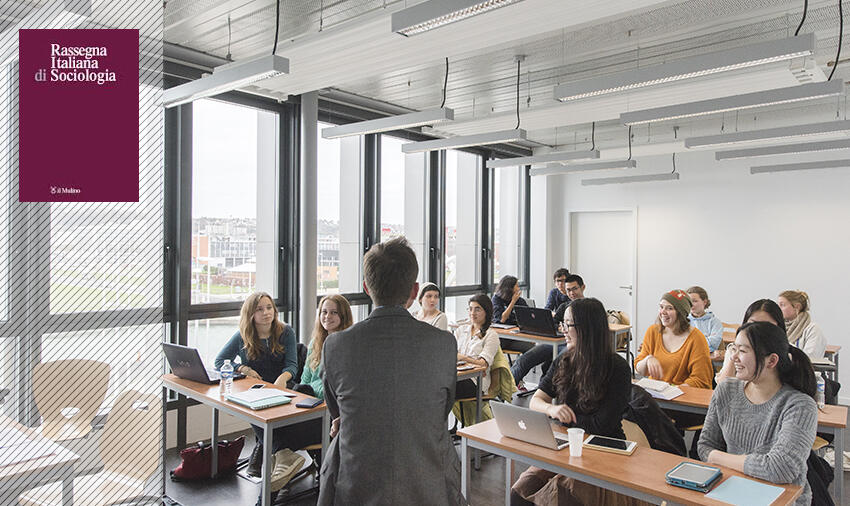Inequalities of access to higher education
Inequalities of access to higher education

 Photo Martin Argyroglo - Sciences Po, Campus du Havre
Photo Martin Argyroglo - Sciences Po, Campus du Havre
CALL FOR PAPERS
Inequalities of access to higher education: The role of policies, institutions and markets
Editors: Marco Pitzalis (Università di Cagliari) e Agnès van Zantes (Sciences Po, Paris)
- Deadlines and guidelines
- Abstracts due by June 15, 2016. All abstracts (500 words), with 5 keywords, must present the theoretical approach of the intended article, the data on which it is based and how it was collected and the main results and interpretations. They must also state how the article relates to one or several of the main themes of the special issue.
- Communication from the Editors concerning the selection of articles by July15, 2016.
- Submission of first versions of articles to the editors by October 15, 2016. Articles should follow the journal guidelines and should be written in English
- Peer-review process: October 15 2016-February 15, 2017.
- Revised versions sent to the editors and journal by March 15, 2017.
- Publication on issue 2/2017
Editorial Board: Paolo Umiltà (paolo.umilta - at - mulino.it)
- Scopes, focus and topics
This issue intends to create a new dialogue among social science researchers working on inequalities of access to higher education and to encourage the development of a comparative perspective, particularly across European countries. While the editors welcome contributions that describe existing inequalities on the basis of social class, ethnicity, gender and age, and especially how these different factors interact with each other, the focus is, more specifically, on the ways in which policies, institutions and markets influence the extent and shape of inequalities of access. Each of these dimensions can be treated separately or simultaneously. Contributors might focus on a specific level (macro, meso or micro) or on their interrelation, on a single set of actors (policy-makers, secondary or higher education administrators, professors or counsellors, market professionals, students and parents…) or on their interaction and on various types of schemes, devices, processes and practices.
Statistical and qualitative as well as mixed-methods studies are equally welcomed. Cross-country comparisons are encouraged but proposals can focus on specific countries and localities if they show awareness of global dynamics and/or processes in other national settings.
Supranational, national and local policies
One of the main purposes of the issue is to understand the influence of both entrenched policy choices and new policy developments on inequalities of access to higher education. Contributors might focus on supranational policies, including the new higher education framework promoted by the Bologna process or directives and guidelines on higher education targets and goals from the European Union. Papers addressing the dynamics at work in a specific country or comparing various countries might focus on a wide range of policies affecting inequalities, including the organisation of transition from secondary to higher education and the prevalent rules of admission in public universities or other public higher education institutions as well as policies related to fees, financial aid and housing provision for HE students. Contributors might also analyse policies explicitly designed to reduce inequalities of access between social groups such as affirmative action and widening participation schemes, their specific national features and dissemination across countries and their effects. Proposals focusing on higher education policies developed by regional or local political authorities are also welcomed, as well as comparisons across regions and localities within the same country.
Institutional processes and practices
A second purpose of the issue is to examine more closely how institutional processes and the practices of institutional actors contribute to the reproduction or reduction of inequalities. Contributors might focus on differences between secondary schools in the way they prepare students to access higher education or certain types of higher education institutions depending on their provision of tracks and options and on their curriculum, and how it is enacted through teachers’ selection of subjects of study, pedagogical practices and evaluation techniques, as well as on the type of counselling on higher education choices provided by teachers and other personnel. Proposals might also address the activities developed by higher education institutions to attract and advice incoming students including information on their websites, open doors, campus visits, summer courses etc, as well as institutional admission procedures and how they affect the profiles of students who apply and who integrate the institution. Contributions focusing on informal and formal links and partnerships between secondary schools and higher education institutions, including those developed within the framework of widening participation policies, are also welcomed.
Market dynamics, actors and devices
The third main focus of the issue concerns the influence of markets in higher education and their effects on inequalities of access. Contributions might focus on market dynamics at the global level fostered by the strategies of leading worldwide higher education institutions but also by actors involved in the development of higher education as a global business, as well as by devices such as international rankings. Papers can also address the influence of markets at the national level. This might include the analysis of competition between higher education institutions for students in general or for specific categories of students and the influence on these processes of the existence or recent development of private institutions. Another possible focus is the role of private agencies and actors offering services to help students fund their studies, study abroad, prepare for entrance examinations, tests or interviews and make decisions about choices of institutions and fields of study. Papers focusing on market devices providing information and advice on higher education such as students’ guides or students’ fairs as well as on institutional and/or market devices that organize access to higher education such as central application services are also encouraged.









